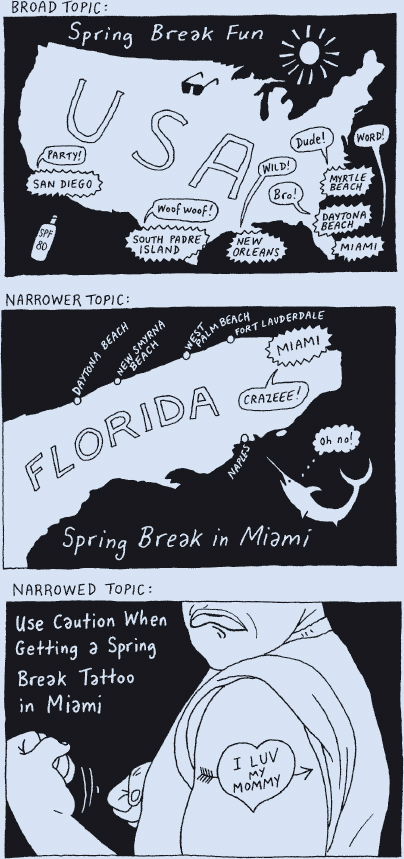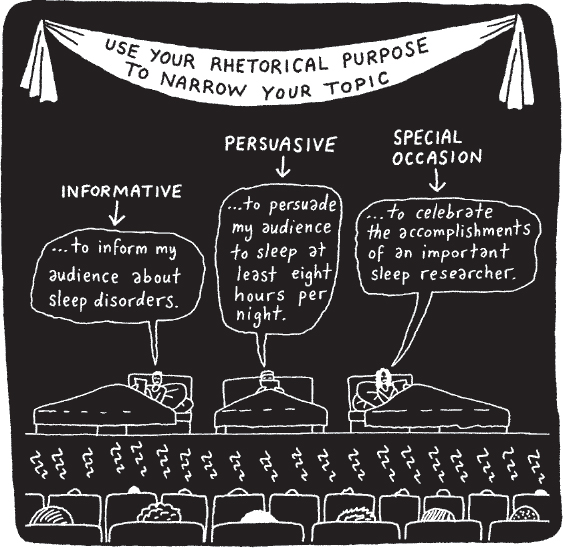Narrow Your Topic
Printed Page 176
Once you’ve determined your rhetorical purpose, think about which aspects of your topic you want to cover in your speech—in other words, how will you narrow your topic so that you fulfill your rhetorical purpose? You can’t cover all aspects of the topic in a single speech, so you need to decide which aspects to focus on.
Narrowing your topic is vital for several reasons. First, it allows you to fit your speech into the available time. Whether you are speaking in a classroom or in your community, it is inconsiderate to take more than the time allocated for your presentation. Audiences may stop listening if you exceed the time limit. Also, resist any urge to speak fast or to cover each idea sketchily in order to say everything you had planned. Audiences don’t respond well to those tactics.

Second, narrowing your topic helps you focus your speech. This is an especially important step for new speakers, who often select overly broad topics. When giving a speech on a specific sport, such as cricket, a novice speaker might try to cover the equipment required, the rules, techniques for playing well, and maybe even the sport’s history—way too much for the speaker to adequately cover or for listeners to remember.

Conversely, one of the best sports speeches we ever heard succeeded because the speaker effectively narrowed the topic of tennis. She focused her informative speech on four interesting professional tennis personalities. The points she covered—such as the classic 1973 “Battle of the Sexes” match between Billie Jean King and Bobby Riggs—truly captivated her audience. Even listeners who were not tennis fans or had not yet been born when that match took place enjoyed and remembered the speech.
How should you narrow your topic? Many of the techniques you used to select your topic can also help you narrow it.
Remember Your Audience Ask yourself whether the aspects of your topic will be interesting or important to your listeners. Kendra, a student who wanted to deliver a speech about figure skating, surveyed her classmates and found that few were interested in learning how to skate. However, most of the class planned to watch the Winter Olympics on television. Kendra narrowed her topic with the Olympics viewers in mind, choosing to explain in her speech how listeners could score the skating events while watching at home.
Draw on Your Interests and Expertise Your special expertise or unique perspective on an aspect of your subject area can help you narrow the topic. Consider Caesar, a student who had attended school in both Mexico and the United States. He selected high-stakes testing (tests for which failure has serious consequences, such as the inability to graduate or be promoted) as his speech topic, and narrowed that topic based on his own educational experiences. He compared tests that students in the United States take with those that students in Mexico must take. His listeners were interested to learn that some of the same controversies surrounding testing in the United States have also emerged in Mexico.

Review Your Rhetorical Purpose Try to narrow your topic to an aspect appropriate for your rhetorical purpose. For example, suppose you wanted to give a speech about sleep. A focus on sleep disorders and sleep science could make an appropriate informative topic. A speech extolling the benefits of getting eight hours of sleep a night could be an emphasis for a persuasive speech. And a speech honoring the director of your university’s sleep research center would make a great special-occasion speech.

Evaluate the Situation You can also use situational characteristics to help narrow your topic. For example, one student, Michelle, was interested in entomology (the study of insects), so she chose bugs as her topic. Initially, she considered narrowing her topic to the use of insects to determine time of death of murder victims. But she rejected that idea when she remembered that she would be delivering her speech shortly after lunch—when listeners might be especially squeamish. Instead, she (wisely) narrowed her topic to interesting facts about bees, including how they make honey—a perfect after-lunch focus.

Click the "Next" button to try Video Activity 6.2, “Overused Topic (Needs Improvement).”